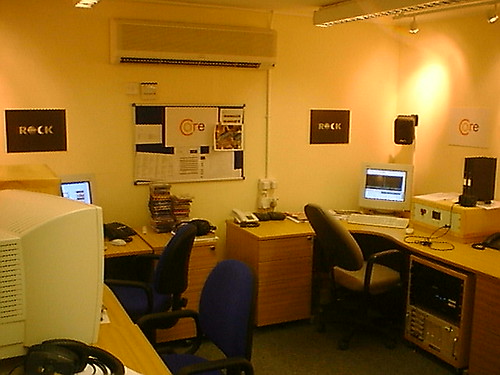It’s really great to meet radio people from around the world, and talk with them about their own plans for digital radio. But I’m often surprised about how much confusion surrounds DAB, particularly the (mis)information about DMB.
It’s important that radio people inform themselves properly and independently about the technology choices they are making. This isn’t as easy as it seems.
Follow the money
What isn’t widely understood is how money flows around the business of consumer electronics these days. You might think that a manufacturer makes money through retail margins – selling radios at a price higher than it cost to produce them. That’s certainly true, but the economics of the last decade or so have eroded retail margins to be incredibly slim. You don’t make much money simply by selling radios.
One of the issues that is new to radio people is IPR – Intellectual Property Rights. IPR represents some “cleverness” that a company (or group of companies) has thought up to make technology work better/cheaper or both. Legally, they “own” that idea or process, and they can choose to licence it to third parties. A modern consumer electronics device (like an MP3 player) may have IPR from twenty or thirty companies in it, and everyone of those companies is entitled to a licence fee. There has recently been a case where consignments of MP3 player have been seized because the manufacturers have not been paying the IPR for using the MP3 technology.
Here’s a specific example: To enable DAB+ or DMB requires an audio encoding technology called HE AAC, combined with a technology called SBR (Spectral Band Replication). These two technologies cost €1.60 and €0.15-€0.20 to licence per receiver respectively. So every DAB+ or DMB enabled receiver generates €1.80 to those companies who own the IPR rights. Multiply that across every radio sold in the world, and that’s a substantial amount of revenue. Put it another way, if you sell a DAB+ radio for €20, as a manufacturer you might get €0.50 from the retail margin, but as an IPR licensee you might make €1. Making radios is not as profitable as making the technology to go into radios.
But here’s an interesting thing. A DMB device also needs another technology called MPEG II Transport Stream. That adds another $0.50 per device. So a DMB device automatically has a higher cost, even if it only ever decodes audio. And there’s another $0.50 per device flowing to an IPR holder (or group) somewhere.
So who owns this IPR?
It’s not always clear who benefits from these extra licensing fees. But it does stand to reason that the companies who have IPR rights in a particular technology will be those companies most enthusiastic about promoting it and getting it widely adopted. And boy, there’s no wider adoption than radios. (100m radios in the UK alone – only 70m mobile phones). It’s a vast vast opportunity. If you’re an IPR holder, even if it’s only a total of €0.10 per device, you could be looking at millions and millions of Euro in licence revenues for decades to come – just by persuading someone to use your technology.
So now it makes sense why a technology company might fly people around the world, and make expensive “prototype” devices to encourage uptake of that technology in which they might have IPR rights -both declared and potentially hidden too. A few hundred thousand Euro in airfares, flights and prototypes might net millions of Euro return.
(It would be like the petro-rich countries encouraging the development and universal adoption of the internal combustion engine. Whatever the development and marketing costs were, they would quickly be dwarfed by the petro-dollars rolling in for decades and decades).
Take your technology advice carefully
Here’s a harsh statement – don’t trust technology suppliers to give you impartial advice. They might benefit substantially from your decision. They are selling you a solution, and your consumers will be paying for it with every device they buy, for ever.
So now you have an insight to the motivation of technology suppliers, who can give you impartial advice?
Well, the answer is that few people can give you genuinely impartial advice. But I would suggest that other broadcasters probably have objectives more similarly aligned to your own, and rarely have an IPR interest, so their advice might be far less prone to distortion. But of course, they don’t make any money from their advice, so sometimes it’s hard to justify spending a few hundred Euro one a flight and a hotel to discuss these things.
I’m disappointed that our colleagues in France have an expectation of Digital Radio that’s virtually identical to ours, but have been sold a completely different set of technologies to delivery it – technologies that will add about €0.75 in IPR to every single digital radio sold around the world. We can’t afford to make that mistake again.
DAB, DAB+ and DMB
Sometimes it appears that technology suppliers would prefer the simplicity of DAB to be obscured from broadcasters. It obviously helps them sell a solution if the solution looks hard.
DAB isn’t complicated, but you do have to know your options.
Everything in DAB starts with the multiplex, and the multiplex can support a mix of technologies all co-existing in the same set of spectrum and on the same infrastructure. The most prominent DAB applications are:
- DAB – confusingly, the same name as the multiplex. DAB refers to the original method of broadcasting radio using the MPEG Layer II audio encoder, and this is now largely superseded by DAB+. You can add visuals to DAB using Slideshow at frame rates of up to 1fps.
- DAB+ – the way to transmit Digital Radio. DAB+ is a direct upgrade of DAB. The great thing about DAB+ is it supports exactly the same data services as DAB, so there is a clear migration path for countries using DAB now (like the UK) into DAB+ without starting from scratch again.
- DMB – the way to transmit mobile TV. DMB is substantially more complicated and expensive to transmit, and on the receiver, than DAB or DAB+. Unless you absolutely need to transmit TV (moving pictures with synchronous audio), you should not be considering DMB at all. The extra IPR load on the receiver of DMB is nasty, and makes the idea of a €50 radio with a colour screen virtually impossible.
I don’t think I can make it clearer than that. Don’t use DMB for radio, as it’s unnecessarily complex and expensive for radio, even radio with visuals. Use DAB+, as it was beautifully developed (largely by broadcasters with no IPR interests) to work brilliantly for radio. DMB was knocked up in a hurry to support mobile TV – it works, but it’s not elegant. But you can mix them all together in the same DAB multiplex just fine.
Radio companies of the world need to stick together
Together there is enough knowledge and understanding of the technology within broadcasters not to have to rely solely on technology suppliers for advice. The problem is that we appear to be really lousy at talking to each other about it. The WorldDMB Technical Committee helps a bit, but often decisions are being taken at higher levels than that, and there simply aren’t enough commercial radio broadcasters participating in WorldDMB.
That needs fixing before we fall into another IPR trap that will cost us all money.

